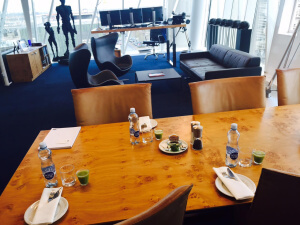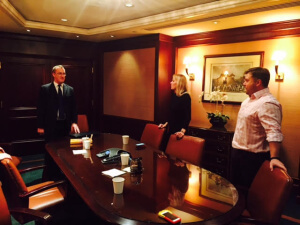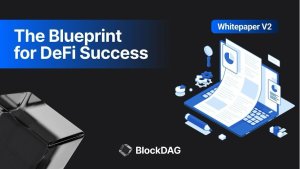As smaller retail brokerages take increasing interest in device neutral platforms, is the end of the desktop nigh?
The importance of mobile trading platforms has been emphasized for a number of years now, to the point where it has become a standard component within the specifications of solutions offered by electronic trading platform providers. Gone are the days when a default mobile application from a third party software provider which was specific to […]

The importance of mobile trading platforms has been emphasized for a number of years now, to the point where it has become a standard component within the specifications of solutions offered by electronic trading platform providers.
Gone are the days when a default mobile application from a third party software provider which was specific to each operating system was sufficient, as brokers and institutions require more these days, specifically that in order to maintain client engagement, and lifetime value, device-neutral mobile solutions are now of paramount importance.

One of the pioneers with regard to this direction was fintech-orientated Saxo Bank, which launched its SaxoTraderGo platform in Paris in the summer of 2015.
That particular platform majored on its compatibility with any device whether desktop or mobile, regardless of operating system and provided white label partners to write their own software via an open API in order to assimilate the platform into their native systems, whether a local bank or portfolio management firm.

During the course of last year when such developments were made, FinanceFeeds investigated the research and development within many platform providers and marketing experts, the overlying aspect on which all concurred being that desktop solutions have a limited future, and the age of mobile-first (or mobile-led) retail trading environments is now upon us.
The worldwide center for technological research and development is the San Francisco Bay area, and is concentrated in development hubs such as Palo Alto and Mountain View, however with the exception of some bitcoin technology startups, the presence in that area of FX technology developers is relatively low.
Recently technology-led electronic trading company OANDA Corporation located their R&D center in Silicon Valley, led by Natasha Lala. From there, the company develops its advanced range of proprietary platforms, with very little competition from other firms.
Following in these footsteps, Fortex launched its MT4 web trader last year, which was quickly onboarded by Australian FX firm Pepperstone, and today the Fortex platform has gained another brokerage, this time small, retail firm Axiory.
This is the point of interest. For large, technology led success stories such as OANDA Corporation, Saxo Bank, IG Group or Swissquote, where discerning customers have a keen interest in operating via a trading environment that has been designed by a top of the range team of very high quality engineers and is backed up by massive corporate strength, continual R&D and remaining ahead of the pack in terms of technology is not only essential, but is part of the enthusiastic ethos of the senior executives.
I had lunch with Kim Fournais, CEO of Saxo Bank in December during a private meeting in his office at the company’s global headquarters in Hellerup, Denmark, during which we discussed the interesting technical developments that the company is working on. Some 24 years after the founding of Saxo Bank, Mr. Fournais’ contagious enthusiasm still shines through, he explained the company’s direction with the verve and vigor of a start up fintech entrepreneur who just came up with the ‘next best thing.’ This is not a career, its a way of life for leaders of such firms.

The reason that this is poignant is that Axiory, the small brokerage which just took Fortex’s device neutral webtrader, is not in that position at all, and would ordinarily be a company that would take a default MetaTrader 4 white label license for $5000 and then concentrate on retail sales. Indeed, most clients for such companies these days are in emerging markets such as those in the Far East (Malaysia, Indonesia, Thailand, for example) and the EMEA region, all of whom are very much used to the ubiquitous MetaTrader 4 platform, and all of whom favor the compatibility with EAs of the MetaTrader platform as well as the ease of bring on new clients who would easily switch from another MetaTrader 4 brokerage and not be ‘scared off’ by having to learn a new platform.
After all, there is a tremendous difference between clients of a small retail brokerage and commercial clients of the aforementioned giants who would write their own trading applications, or indeed would be a financial institution in their own right.
This means that for companies such as Axiory, the ability to offer device neutral solutions is more critical than being able to offer the familiarity of the MetaTrader 4 platform, which is very interesting indeed.
David Kasper, Co-founder of Axiory made reference to this today when he made a corporate statement with regard to the onboarding of the Fortex web-trader.

“With this strategic alliance, Axiory is making great strides to demonstrate our ongoing commitment to our client base. Fortex MT4 Webtrader will help us to deliver the latest cloud-based, high performance and modern web trading solution to our clients” he said.
In regions with a very young population, which includes a number of important regions for retail FX firms these days, this is critical because the ‘Millennials’ in such regions are very familiar with smartphones and tablets, and nowadays are not tied to just one device for a number of years, often trading in for new models from other manufacturers after a number of months, which under a non-device neutral system, would require a fresh download and a reset of all settings, rather than to just log on and carry on with no need to reinstall or set trading preferences.
The future of devices which will form the hardware basis for trading is changing rapidly to the point where the next generation of traders may look at a desktop PC in rather the same light as our generation may look at the 8-track player.
Featured image: Natallia Hunik, Head of Institutional Sales at Advanced Markets & Fortex gauges the demand for device-neutral trading environments at iFXEXPO Asia 2016, Hong Kong. All photography copyright FinanceFeeds









